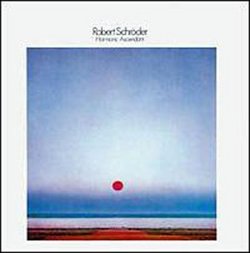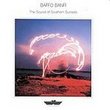| All Artists: Robert Schroeder Title: Harmonic Ascendant Members Wishing: 0 Total Copies: 0 Label: The Orchard Original Release Date: 1/1/2000 Re-Release Date: 1/2/2001 Genres: New Age, Pop Style: Meditation Number of Discs: 1 SwapaCD Credits: 1 UPC: 669910758724 |
Search - Robert Schroeder :: Harmonic Ascendant
 | Robert Schroeder Harmonic Ascendant Genres: New Age, Pop
|
Larger Image |
CD DetailsSimilar CDs
|
CD ReviewsMusic to take a bath to P. Roe | Harrow, London | 03/01/2002 (4 out of 5 stars) "The notes on the back of this album describe it as 'music to take a bath to'. I would absolutely agree with that. The main track starts off gently and immerses you in its warm and caressing sounds. Later you are scrubbed down with a gentle but firm sequence which builds up slowly to a semi-climatic cold splash, before soothing away your cares with a gently accoustic guitar close. At 20 odd minutes this is perfect relaxation listening. The other 2 tracks, using a vocoder voice sequence also build up over an aural landscape which hits the spot without the punch. Essential synthesizer listening." Early Droning Ambient Music snowleopard | Oregon | 06/03/2008 (5 out of 5 stars) "Robert Schroeder is a German electronic musician who got started back in the late 1970's somewhat under the tutelage of Klaus Schulze, recording many albums on the DAmusic label then Racket Records. Being somewhat of a collector who owns hundreds of CDs in this vein, I own nine Robert Schroeder CDs. I will list them all here in order, with brief comments, then a full review of the CD listed here. 1. Harmonic Ascendant (1979) - Long droning compositions, produced by Klaus Schulze, very meditative but with mix of acoustic instruments, and early synthesizers that Schroeder had a hand in building himself. Despite the ambient nature, this isn't what I'd really call space music. It's more like Mike Oldfield meets Krautrock. 2. Floating Music (1980) - Two very long suites, again produced by Klaus Shulze. More active and less meditative than Harmonic Ascendant. Though at times the drones are good, the more structured parts sound a bit forced and not that memorable. None the less, a well produced album worth picking up if you're a fan of the era. 3. Galaxie Cygnus - A (1981) - Despite the spacy title, not an homage to space music from the mid-1970's per se, at least not as much as the previous two, as Schroeder moved further away from Schluze shadow. 4. Paradise (1983) - A unique direction, with a nice digital, spatial sound, and some peculiar voice whispers, if a bit repetitive. Some of the sounds are to this day fairly unique considering the experimental nature of much of the album, but other aspects sound terribly dated synth music. 5. Computer Voice (1984) - Somewhat of a re-mix/re-recording CD of various earlier Schroeder cuts modernized in a less droning, and more traditionally arranged format with more song structures and better control over synth sequences. Some of the leads go on a bit, and it sounds dated at times, but real effort was put into this at the time to refine and perfect an attempt at a more structured electronic sound. To this day, some of the cuts hold up quite well. 6. Brain Voyager (1985) - A new direction for Schroeder. I didn't like it at first, expecting an even more broadening of sound from Computer voice, but after several listens, it has a very nice sound to it, using an engineering stereo imaging system called the "dummy head" to create a very open sound. The arrangements are fuller than what came before (and after), even if the album doesn't have the coolness that Computer Voice did. 7. Time Waves (1987) - While the fuller sound Schroeder grew into on Brain Voyager is at times present, just like part of early and later works, much of this CD sounds very dated digital synth music from the late 1980's. 8. Driftin' (1988) - Fully into the digital synth age, this CD sounds quite dated, with patches used by many other musicians from that era and a production that has a clean, but often drab sound. Some nice melodies help cut through. 9. Pegasus (1989) - Schroeder returned somewhat to a more ambient sound, with lush, digital landscapes. Almost gone are the drums and drum machines, and the leads are often blended more fully into the mix than before. There's a lot of digital filter sweeps here that grow old and put the CD in it's era, but there is also some thick, powerful pads that give the CD a rich sound. " Harmonic ascendant driftin' in timewaves Deven Gadula | san francisco, ca, united states | 12/11/2009 (5 out of 5 stars) "It seems like Robert Schroeder is still musically active. He had just released an album earlier this year. I have a feeling it is just a matter of months before Harmonic Ascendant will be available as a download. The release may not end up renewed on a disc, for obvious reasons. Harmonic Ascendant was the first album released by Robert Schroeder 30 years ago in 1979, 20 albums ago. It is not his best work, because to me it is very uneven. It was definitely a full album release but it almost feels like the title song is placed on side A with a couple of compositions added on side B to fill the space. However, I do have all of Robert Schroeder's albums and to me the title song, 22 minute long Harmonic Ascendant is not only his strongest music to date, but one of the most beautiful electronic suites full of beauty and light.
Electronic music of the 1970s was the music I was studying to and all the albums of the German line of Tangerine Dream, Klaus Schulze, Edgar Froese, Kraftwerk, Ash Ra Tempel, as well as the music of Vangelis, Mike Oldfield, Rick Wakeman, Tomita and later on Jean-Michell Jarre were my afternoon's background. I know that music really well and when I first heard Harmonic Ascendant I knew that it was different than anything else I have ever heard. The overall mood of this suite makes me thing of some mixture of one of typical great pieces of Tangerine Dream from the middle 1970s mixed slightly with some cello sonata. And this statement is a bit misleading, because it is not the classical music climate I am referring to. To find that I would point you towards Tomita or Rick Wakeman. Robert Schroeder was able to add fullness of acoustic sound to his composition and together with its beautiful mellow progression it turns this song into a very emotional experience. Klaus Schulze calls Robert Schroeder a romantic contemporary musician. Klaus was enamored by Harmonic Ascendant as well and when he received the demo tape he wanted to get involved right away, and he has recorded, mixed and produced this album. One of Klaus's friends upon hearing this music said it felt like you were taking a bath in it. I do agree with this assessment. Harmonic Ascendant makes you feel safe and warm, and when you listen to this music you know there is more out there which your eyes can't see but your soul can sense. Robert plays self-built synthesizers only (isn't that unusual?) and he is being supported here by Udo Mattusch on guitar and Wolfgang Tiepold on cello. You are floating in the lightness of sound and texture and you just want to stay there. At least I do. It is hard for me to listen to this suite only once. I usually play it on repeat several times for a couple of hours and then move on, or as I often do, I use my compilation of Robert Schroeder's music and mix it all the other music I like and hit shuffle on my disc changer. I know that Brain Voyager gets the most recognition. My other 2 favorite albums by Robert Schroeder come from 20 years ago: TimeWaves (1987) and Driftin' (1988). The music of those albums may get dismissed by some as high quality elevator music, but that will happen if you are either allergic to electronic music (I have met quite a few people like that in my life) or you did not listen to the music enough. Robert Schroeder is one of these musical geniuses who are not afraid to defy time... Well, he has a few of these...time distortion moments on those albums, and I absolutely love such situations. I have called my 2008 Robert Schroeder compilation: Harmonic Ascendant Driftin' In TimeWaves: 1. Wishes 2. Harmonic Ascendant 3. Imagine 4. Elements 5. Soft Touch 6. The Message " |

 Track Listings (3) - Disc #1
Track Listings (3) - Disc #1